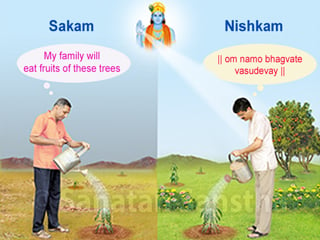Every human being constantly strives to attain happiness. He tries to acquire happiness through worldly pleasures and science; however, this happiness is not permanent because it is a part of Maya (The Great Illusion). Every happiness in Maya finally has an end. The happiness which is of the highest form and permanent is known as Anand (Bliss). In this universe, there is only one source of eternal flow of Anand and it is none other than the ‘God Principle’. Hence, as you make efforts to merge with the God Principle, you begin to experience the sweetness of Anand. What is sadhana can be stated as making efforts to merge with the God Principle is itself called sadhana.
1. Definition and meaning of sadhana

A. Sadhana is the process of achieving the goal of God-realisation easily.
B. Sadhana is a beautiful blend of efforts in the form of action and thoughts about Sat (Absolute Truth).
C. Due to the union of triguna : Sattva, Raja and Tama, prarabdha-karma, kriyamana-karma and the Panchamahabhutas (Five Cosmic Principles), innumerable layers are created around the soul. Getting rid of all these layers, steadying in the basic soul Principle and merging it into the form of Paramatma (Supreme soul) is known as sadhana’. This is another term for ‘God realisation’.
2. Importance of sadhana
A. If the health has deteriorated due to spiritual reasons, it is essential to enhance sadhana to improve it
In the life of an average individual, 20% problems take place due to physical and / or psychological reasons. Another 30% are due to spiritual as well as physical and / or psychological reasons. The remaining 50% are only spiritual (for example, destiny, distress caused by negative energies, problems due to unfavourable position of stars in the horoscope) in origin. Since science cannot overcome these spiritual causes, obviously it also cannot overcome the unhappiness arising from them. The spiritual causes of unhappiness can be overcome only with the help of sadhana. Research conducted in the west has proved that sadhana helps in curing many physical and psychological illnesses. Sadhana also bestows man with the strength to endure unhappiness. Besides, it also helps in the development of Divine virtues like faith, sacrifice and courage in a seeker, making his life ideal and complete. This means that by performing sadhana, 80% problems can be resolved or the ability to endure them can be acquired.
B. Along with Dharmacharan (Abiding by Dharma), sadhana is essential
An individual who abides by Dharma meticulously gets enriched physically as well as psychologically. He has good spiritual energy. Yet, only appropriately abiding by Dharma is insufficient; it needs to be complemented with regular sadhana. This enriches the physical body and mind of the individual in the true sense.
Since it is God Himself who has established Dharma, while abiding by it, the individual automatically obeys the command of God. That is why, the individual becomes deserving of His grace. Abiding by Dharma does not merely mean worshipping God; it means perceiving God in everyone and fulfilling all duties unto them with Priti. To merge with Parameshwar (Supreme God), there is no alternative to performing sadhana as per the Hindu Dharma.
C. Harm incurred by not performing sadhana
1. In the absence of sadhana, meaning, in the absence of Krushnatattva (Shrikrushna Principle), functioning of the brain and the intellect’s decision-making ability reduces : Negative energy attacks on a feeble and emotional mind and create a black covering around it. As a result, the bond of Krushnatattva around the brain and mind is destroyed. The black covering around the intellect stops the flow of Krushnatattva from the brain to the intellect centre. Absence of sadhana in the previous and present birth results in deficiency of the Krushnatattva in the brain. This in turn reduces the functioning of the brain and that of the intellect to take appropriate decisions. Layers of black covering get created around the intellect, making it and the mind impure. Hence, the individual takes inappropriate decisions and errs in his kriyamana (Willful actions). Besides, problems like inability to think, forgetfulness etc. also take place. The covering of ego reduces the functioning of the intellect and his ability to take decisions.
2. If sadhana is not performed despite receiving respect and honour, life is wasted : If a sharp intellect is not supported by actual spiritual actions, then the life of the individual, despite being blessed with respect and honour is wasted.
3. God punishes the virtuous people who do not perform sadhana : Some people are virtuous from birth itself. Only if they surrender their virtues to God, their sadhana will take place; else, they will only be referred to as ‘virtuous’ in the society. This label has no value at all for God. When this virtuous individual dies, God will say to him, “Since you were virtuous, I gave you birth on the earth sooner. However, you did not perform any sadhana there and just behaved like a virtuous individual. Now, you will be born in a species based on your actions”. The real purpose of a human birth is to perform sadhana. Else, after death, even virtuous people are likely to be punished by God.
3. Benefits of performing sadhana
A. Benefits of sadhana from the previous birth
If there is inner purity of the soul due to sadhana performed in the previous birth, then at birth itself the spiritual level of the individual is high and his ego too is less.
B. Benefits according to Karmayoga (Path of action)
There is an increase in the ability of the individual performing sadhana to overcome their destiny. Along with efforts to overcome destiny and to utilise wilful actions bestowed by God, the individual performing sadhana utilises his karma to perform sadhana. As a result, the destiny of the individual does not increase, and as per karmaphalanyay, God does not want him to experience more destiny. Hence, God showers His grace upon the individual who performs sadhana and helps in overcoming his destiny. In other words, God enhances the ability of the individual to complete his destiny.
C. Benefits according to Dnyanyoga (Path of knowledge)
Sadhana enhances the introversion of a seeker and he is able to distinguish between right and wrong easily. Due to sadhana, the brain and mind of the individual gets connected with Chaitanya (Divine consciousness). The function of the brain being sattvik (Sattva-predominant), the sensations arising from the brain at the level of thoughts and actions also become sattvik. Hence, the introversion of seekers increases, and they are able to distinguish between right and wrong easily.
D. Benefits according to Bhaktiyoga (Path of devotion)
1. The covering of ego begins to thin out through prayers, spiritual emotion of surrender and spiritual emotion of gratitude : To reduce the intensity of ego, it is necessary to purify the mind and enhance his capacity. When the manodeha (Mental body) gets 50% purified, purification of the intellect and ego begins. If there is yearning and bhav (Spiritual emotion) in a seeker, then despite the manodeha undergoing 30% purification to perform the mission of the Guru, with His grace, purification of the karandeha (Causal body) and mahakarandeha (Supracausal body) begins. For this to happen, intense Iccha-shakti (Energy of will) is essential. Through prayers, spiritual emotion of surrender and spiritual emotion of gratitude, the covering of ego begins to thin out.
2. On performing sadhana, perception of Chaitanya within the self is experienced : God exists in all people on the earth. Human beings born on this earth are also a part of God. Hence, the Chaitanya of God exists in every human being. Man cannot realize this without performing sadhana. If he does not perform sadhana, he does not experience God within himself.
3. Benefits to the disciple : An individual who surrenders unto the Holy feet of the Guru and remembers only the Guru, proves to be superior in all the lokas (Subtle regions). He is released from the cycles of birth and death, and is thus liberated.
Reference : Sanatan Sanstha’s Holy text ‘Sadhana (Spiritual practice)’


 How the path of sadhana (Spiritual path) created by God has changed over various Yugs (Eras)
How the path of sadhana (Spiritual path) created by God has changed over various Yugs (Eras) Why Nishkam sadhana is superior to Sakam sadhana ?
Why Nishkam sadhana is superior to Sakam sadhana ? Importance of performing sadhana under the guidance of a guru
Importance of performing sadhana under the guidance of a guru